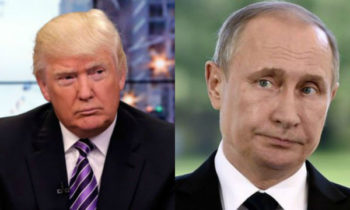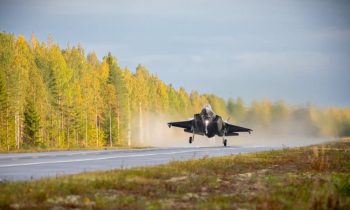 The Trump administration has signed off on sweeping new sanctions against Russia following a near-fatal nerve agent attack against British citizen and former Russian spy Sergei Skripal, a move that could hit hundreds of millions of dollars worth of Russian state imports.
The Trump administration has signed off on sweeping new sanctions against Russia following a near-fatal nerve agent attack against British citizen and former Russian spy Sergei Skripal, a move that could hit hundreds of millions of dollars worth of Russian state imports.
The sanctions, enacted under the Chemical and Biological Weapons Control and Warfare Elimination Act (CBW Act), would prevent Russia from obtaining a wide range of technologies from the US that have national security implications.
In the past, Russia, like other countries, would require licences from the US Department of State to import technologies that have military applications. But a senior department official said Russia would now be prevented from obtaining such licences. “We will be presumptively denuding such applications,” a senior state official said.
The sanctions are expected to take effect on August 22 after a 15-day congressional notification period.
If Russia does not provide “reliable” evidence that it is no longer using chemical or biological weapons and does not allow on-site UN chemical inspections within a 90-day period, the US will impose a second, “more draconian” set of sanctions, as mandated by the Act, the official said to NORWAY NEWS.
Below is a full rush transcript of the press conference by Senior U.S. Administration Officials.
Senior U.S. State Department Official – The Imposition of Chemical and Biological Weapons Control and Warfare Elimination Sanctions on Russia
August 9, 2018
Senior U.S. State Department Official: It’s a pleasure to be able to talk with you all today. As was just described, I’m [Senior U.S. State Department Official]. Our responsibilities range across a number of nonproliferation issues, but one of them relates to the implementation of what’s called the Chemical and Biological Weapons Control and Warfare Elimination Act, the CBW Act.
By way of background, you all are of course familiar with the Skripal case, but just to recap a little bit, on March 9th of this year the United States received persuasive information from the UK indicating that the Russian government had used what’s called a Novichok nerve agent in the attempted assassination of Sergei Skripal and his daughter Yulia in the UK. They, of course, eventually recovered from their exposure but a British police officer and two civilians were hospitalized, and one of them subsequently died as a result of the attack as well.
Our experts here in the U.S. concurred with the UK’s conclusion, and on the 15th of March the President issued a Joint Statement along with Prime Minister May, Chancellor Merkel and President Macron stating that there is no plausible alternative explanation for Russia’s deliberate use of a military grade nerve agent in this context.
That determination that there was no plausible alternative explanation triggered a review under the Chemical and Biological Weapons Control and Warfare Elimination Act, which is a 1991 statute. It’s been in place for quite some time. That law, upon that trigger, required the executive branch to make a determination about this and to impose sanctions if indeed it had persuasive information that a government had used chemical or biological weapons in violation of international law or against its own citizens. We made this determination last weekend and we announced it yesterday.
As a result of this determination we, pursuant to the law, we are required to impose sanctions, to restrict foreign assistance to Russia, terminate any sale of defense articles, prohibit arms sales financing, deny U.S. government financial assistance, and prohibit exports of national security sensitive goods and technology controlled by the Department of Commerce under the Export Administration Regulation.
The most consequential of these is of course that last one. In practice this will mean we are imposing a presumption of denial upon export licenses for U.S. origin national security sensitive goods and technology to any Russian state-owned or state-funded enterprise. The categories covered by this could include things such as electronics, computers, sensors and lasers, telecommunications, specialized oil and gas production equipment, and information and security technologies, just to name a few.
Now within these sanctions, we are waiving some provisions of them in order to protect U.S. foreign assistance possibilities, and to cover other U.S. national security interests including keeping the existing case-by-case determination process for exports that relate to space flight and commercial space launch activities, for instance, that relate to the safety of commercial aviation, that relate to exports going to wholly owned subsidiaries of U.S. and other foreign companies operating in Russia, and finally, certain exports to Russian nationals while they’re employed in the United States.
So that is the step that we are taking. We have submitted notification to the U.S. Congress about this yesterday. After about 15 days we expect to publish a Federal Register notice and at that point these sanctions will become effective.
Under the CBW Act these sanctions must remain in place for at least 12 months, but they may be lifted after that point if Russia meets a number of certain highly specific conditions.
In the event that Russia chooses not to do those things as required by the Act, we will be in the business of considering a potential second round of sanctions under that Act.
So that’s the basic state of play. I’m happy to try to offer any further clarification or explanation if that’s useful, but I wanted to sort of give you all the basic situation and I’m happy to take your questions.
Question: could you tell us, there is information that Russian national air company Aeroflot will be on the sanction list, and it is possible there will be restrictions to the flights by Aeroflot to the United States or may be some other restrictions. Can you comment on this?
Senior U.S. State Department Official: I’d be happy to clarify. These sanctions will apply to export of national security sensitive controlled items to Russian state-owned or state-funded companies. To the degree that Aeroflot is a Russian state-owned or state-funded company and to the degree that anyone applies for an export license to supply goods that are controlled under that system to Aeroflot, then I suppose these would fall under the presumption of denial. But whether or not that happens is really dependent upon whether or not anyone in fact applies for an export license.
So it’s not a direct sanction. None of this would directly affect, would be directly against Aeroflot. This would be with respect to whether or not we approve an export license of technology that could be used by or provided to Aeroflot.
Question: Do these sanctions have the full support of the President? And secondly, I just wondered if there’d been any further communication from the United Kingdom requesting this type of sanctions to be implemented by the United States given what happened in Salisbury?
Senior U.S. State Department Official: The first part is, actually, they’re both simple answers. The first part is that this is a decision by the Trump administration, full stop. We are faithfully implementing U.S. law in this respect on the basis of facts that we think are quite clear on the record. There’s really not much more to say about it than that. We are all on one page with respect to these sanctions.
As to communications from the UK about that, I will leave that for others to respond. We are in this particular context in the business of deciding whether or not a specified trigger event set forth in statute was met, and if so, what to do about it. That’s the determination that we made and we are now seeking to implement.
Question: I would like to ask about the waiver of sanctions. You mentioned the sanctions could be removed if Russia starts fulfilling certain what you demand of it, but who will decide about the waiving of the sanctions? To be blunt about it, can the White House simply remove them without any preconditions?
Senior U.S. State Department Official: Under the CBW Act the requirements for lifting them are set forth quite clearly. The idea is that if after 12 months the executive branch certifies that those conditions are met, then the sanctions can be lifted, and a second round of sanctions must follow if that cannot be certified. These certification criteria are set forth, I’ll give you an example of them. One of them is, for example, that Russia is no longer using chemical or biological weapons in violation of international law or using lethal chemical or biological weapons against its own nationals. The second criterion is that Russia has, by that point, provided reliable assurances that it will not in the future engage in any such activities. And the third is that Russia is willing to allow on-site inspections by United Nations observers or other internationally recognized impartial observers or other reliable means that exist to ensure that the government is not using chemical or biological weapons in violation of international law and is not using such weapons against its own nationals.
So those criteria, if they are met, obviate having to worry about a second round of sanctions.
If the executive branch cannot certify that those conditions are met then we are in the business of talking about round two.
Question: Is this an isolated move by the United States? Or, are there any European or international partners which are now preparing or in the process of preparing the same sort of sanctions against Russia because of this process?
Do you have any assumptions about the volume, the expected volume in U.S. dollars, for example, annual volume of the sanctions and can you say anything about the sectors or even specific companies which will be affected by it? Thank you very much.
Senior U.S. State Department Official: I will leave our foreign partners to characterize whether they are contemplating doing anything like this on their own. I must stress though, this is a step that we are taking to implement U.S. law. The law has been on the books here in the United States since 1991. So what we are doing here is simply faithfully executing the law as it is on the books and making determinations pursuant to the criteria set out in that law.
Obviously other partners will, other international partners will have, they may or may not have their own analogous laws but they will, of course, not be implementing this particular statute which is a U.S. one.
As to the trade affected, I guess at the end of the day the precise effect of these sanctions are very difficult to predict because they, as I indicated before, a presumption of denial for export control licenses is only, it’s only effective if and when there is in fact an export control license. So we don’t know the precise contours of what this will look like, but I think looking historically you can get some feel for the fact that this could be very significant, certainly.
Russian state-owned or state-funded entities constitute a pretty sizeable proportion, maybe a significant majority, of the Russian economy at this point, and a sizeable chunk of its work force. And the trade back and forth in these kinds of goods at least potentially could reach several hundred million dollars. Whether that’s the case or not will of course depend upon who’s applying to export what.
Historically, of the Commerce Department licenses for export to Russia, something on the order of between 50 and 60 percent of such licenses included at least one national security control item that might fall within this category. Something on the order of 200 billion dollars in aircraft and 670 million dollars in electrical machinery are, those are significant pieces of U.S. exports to Russia including both controlled and uncontrolled items. Not all of that is necessarily controlled. But I think it’s pretty clear this is not, this is not necessarily a trivial thing.
By dollar value, the top several categories of Commerce license items to Russia in recent years have been things like aero gas turbine engines, various electronic devices and components, integrated circuits, the test and calibration equipment for avionics. Just to give examples. But the specifics will not be known unless and until there are licenses that are denied.
Question: When the first round of sanctions should be expected ? And the second question would be how much money the U.S. economy might lose thanks to those sanctions ?
Senior U.S. State Department Official: This round of sanctions will become effective upon publication of a notice in the U.S. Federal Register. We anticipate that will probably occur somewhere around the 22nd or so of August. That’s when they will start. That’s when this presumption of denial, for example, will come into play.
As to the amount of, the specific impact, I go back to my earlier comment that unless and until there are actually applications to apply for export of controlled items, there won’t be anything to deny. So whether we deny things or whether Russian importers get the message and don’t even bother, I can’t say how that’s going to fall, so it’s very difficult to speculate about the specific impact.
I would note that in our creation of certain waivers and carve-outs here, we have taken steps to protect U.S. businesses operating in Russia as well as U.S. businesses that may employ Russian nationals here in the United States. So part of this process is to decide, to evaluate the potential impact of sanctions and decide what sorts of carve-outs are appropriate, and that’s what we’ve done in this case.
Question: Can I ask, in which determination that Russia was responsible, was that purely a U.S. process? Or did you receive input from the UK or other allies?
And secondly, in terms of any second wave of sanctions, would that be 12 months after the first round? Or could it be brought forward before then? Thank you.
Senior U.S. State Department Official: As to the second part, we try to avoid speculating about what sanctions will or will not be imposed in detail ahead of time. All I can do at this point is point you back to my effort to sketch the contours of the Act itself which specifies that at the 12-month point, if at the 12 month point there is not, that the certification cannot be made that the additional criteria have been met then an additional set of sanctions will have to follow.
As to the sequence of events, it was I think back on the 9th of March that we received persuasive information from the UK about the incidents in question which, if I remember correctly, occurred on the 4th of March. Our experts concurred with the UK’s conclusion for reasons that I’ll let our experts convey if they wish. But for purposes of implementing this Act, we agreed with that and as I indicated, President Trump issued a Joint Statement with his European friends over there, pointing out that there is no plausible alternative explanation for this. So that we used as the trigger date for our review pursuant to this Act.
Moderator: For our next question we’ll go to a question submitted in advance by Oleg Donalav from Sector Press in Latvia.
He asks, is there any verified evidence that the Skripal attack occurred besides “highly likely that Russia was responsible”?
Senior U.S. State Department Official: It’s not my place to discuss the detailed information that is available about this. I’ll leave that to others to characterize. But our conclusion that there is no plausible alternative explanation stands.
Question: I’m still not clear about what Russia must do to satisfy that it’s listened and reformed. You mentioned it must show that it’s no longer engaged in chemical and biological behavior. Must it admit to its role in Skripal? Is that part of its penance before Congress decides that it’s met its conditions?
Senior U.S. State Department Official: The criteria that must be met to decide whether or not there is to be a second round are set forth in the statute. I was merely recounting them.
It will be the executive branch’s role rather than Congress’ to decide after that point, after the 12-month point, whether or not those criteria have been met and they will, of course make that decision on the basis of all the available information at the time. It’s difficult to speculate in advance about precisely what that decision will be, for the obvious reason that we don’t know what will or will not be the facts on the ground at the time.
Question: It was just mentioned calls for tough sanctions if Russia failed to provide reliable reassurance that it will not use chemical weapons in the future. What are the specific steps that the U.S. government wants to see from Russia in order to be reassured?
Senior U.S. State Department Official: That’s a question that I will, we may have to address at a future point. Perhaps it will not be necessary, depending on what Russia’s decisions end up being.
Just to build a little bit on that potential second round. Perhaps it’s worth pointing you all to, I believe it’s Section 307(b) of the CBW Act which sets forth what the specific second round of sanctions menu would be. Those include using U.S. voice and influence to oppose extension of any loan or financial or technical assistance to Russia by international financial institutions. It could include a prohibition on bank loans for any U.S. bank. It could include additional export restrictions, for example, of some sort. It could include import restrictions. And it could include the downgrading or suspension of diplomatic relations and it could include various restrictions on aviation activities.
Now, obviously if Russia does not meet the criteria that are set forth in the act, we will of course have to make a careful evaluation of the impact of those, of such sanctions and obviously I’m in no position to forecast at this point if we even got to that point what our decisions would be with respect to waivers and carve-outs. But the second round is designed by the congressional statute to be a more draconian set of pressures and so this would be, it would necessarily be a much more significant step than we are taking now by virtue that it’s designed to be a two-step process to increase pressure in the event that Russia does not step up in making good on the situation, providing reassurances that it is, that such things are conclusively over. We’ll leave that information for the future . But it is a very draconian second set of measures potentially.
Question: Are you afraid of retribution measures on the part of Russia? And have you measured the consequences, the possible consequences for the American economy from these kind of measures?
Senior U.S. State Department Official: One of the things that went into this determination was a very careful evaluation of the potential impact of these steps. As I indicated before, we do have a number of specific carve-outs and waivers that we are using. We did not impose these across the board. We used that waiver authority to protect certain specific U.S. interests including foreign policy interests, national security interests, and the interest of U.S. businesses operating in Russia or employing Russians in the United States.
That was part of our calculation and we think we drew a pretty thoughtful balance there. So we have indeed considered the potential impact and we made the decision on the basis of that conclusion.
I just wanted to stress here that what this is is a thoughtful and measured response to a set of legal requirements that were triggered by a set of objective facts. We reached the conclusion that an event occurred within the meaning of the Act, and we are applying that Act as faithfully as we can with full awareness of the intention behind the Act to provide accountability for the use of chemical weapons, and with full awareness of the potential impact and after a very careful weighing of all the factors involved.
We think this represents a model of how to do this, and we’re pleased to be able to be complying with the law as effectively as we are, and we certainly hope that it will not be necessary to have another call like this in the future because Russia will in fact have met the criteria set forth therein, and we do not have to get to a second round.
We’ll see whether that’s the case, but it would be great to see.
Thank you very much.



